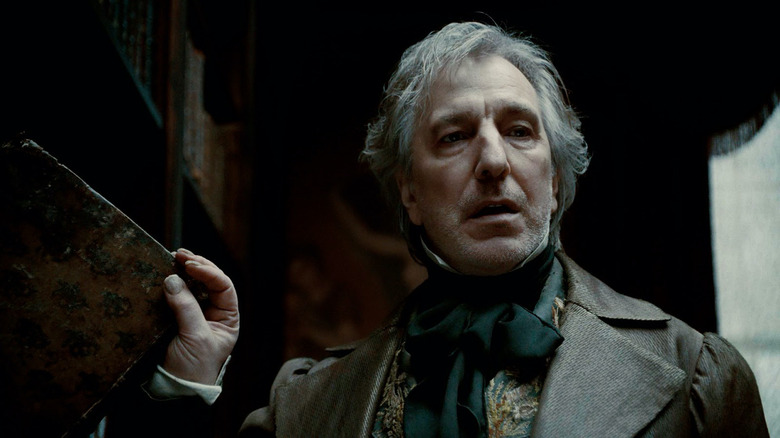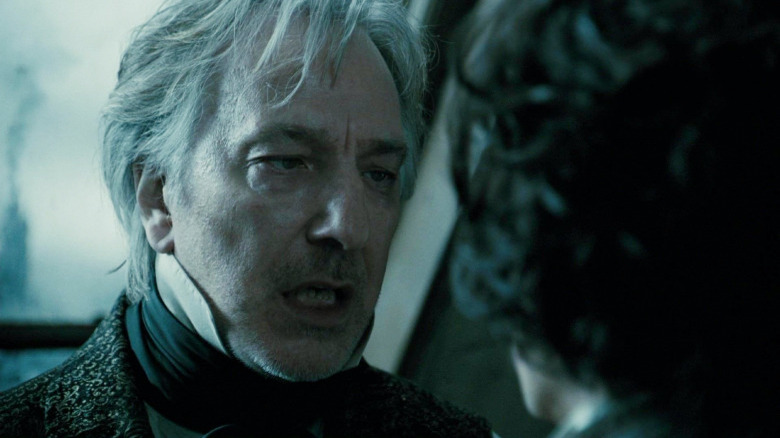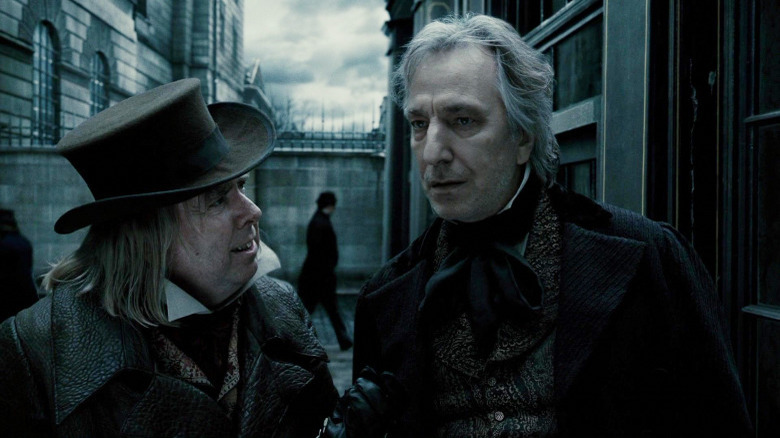Tim Burton's Vulnerability Surprised Alan Rickman While Working On Sweeney Todd
If you never saw a Tim Burton adaptation of a Stephen Sondheim musical coming, you weren't alone. The director, who had made a career out of bringing his grim visions of loner life to the big screen, didn't necessarily seem like the kind of guy who would willingly adapt a work by the king of musical theater. But then, Burton was never one for orthodoxy, and as unlikely as his 2007 effort was, "Sweeney Todd: The Demon Barber Of Fleet Street" stands as proof that even a Sondheim musical can be transformed into a standard Burton creep-fest.
Of course, the original stage musical was already dealing with some pretty creepy material itself. The subject matter, taken straight from the pages of a Victorian penny dreadful, was drenched in the kind of tragedy, melodrama, and horror that has defined the Burton brand throughout his career. In that sense, the director's 2007 adaptation kind of adds up.
One absolute no-brainer, on the other hand, was the casting of Alan Rickman as the evil Judge Turpin. By 2007, the celebrated British actor had demonstrated a particular talent for portraying villains. Ever since his first movie role as the slickly sinister Hans Gruber in "Die Hard," Rickman had been churning out memorable antagonists — from the Sheriff of Nottingham in "Robin Hood: Prince Of Thieves" to the sort of bad/sort of good Severus Snape in the Harry Potter movies (a character whose bitter, sardonic manner was probably helped by Rickman's own feelings about the whole experience). As such, he made a lot of sense to play the judge that exiles Johnny Depp's Benjamin Barker and assaults his wife, prompting Barker's transformation into the titular demonic barber. Still, Rickman would be in for a surprise of his own while working with Burton for the first time.
'It's not like a solid rock of certainty'
Tim Burton was, of course, a well-established director by 2007, and hadn't yet reached the stage in his career where his films started feeling more like parodies of Tim Burton movies rather than actual Tim Burton movies. At the height of his powers, he was unsurprisingly given a lot of control over "Sweeney Todd" and chose to return to Pinewood Studios more than 15 years after shooting 1989's "Batman" on the very same hallowed sound stages. Despite "Batman" apparently being "torture" for him, it seems the director had developed a fondness for London and Pinewood — and what better place to film a "Sweeney Todd" movie than in the character's home country?
And so, Burton, Alan Rickman, and the rest of the film's cast and crew gathered at the historic studio to film their musical horror. In an interview with Female to promote the film's release, Rickman explained what had surprised him about his experience working with Burton:
"He's quite vulnerable [...] To the whole situation, if you watch him. But he knows what he wants. But it's an alive situation. You know, it's not like a solid rock of certainty. I mean, he knows what he wants, but it's alive. It's like, an electric sort of — that's what I mean by vulnerable. He's human inside it all and nervous."
It must have been surprising to see the human side of a director whose on-screen visions always seemed so definitive and self-assured in their dark grotesquery. But this was Burton's first attempt at adapting a Sondheim musical, and so perhaps his vulnerability was showing more than it might have otherwise.
Burton's human side
Tim Burton's films are almost always confidently wrought, especially his earlier work. And in the case of "Sweeney Todd," he was clearly determined to produce an uncompromisingly bloody take on the musical. But despite that confidence of vision, It's easy to see what Alan Rickman saw when you watch the director in interviews. The shy loner kid that grew up drawing and watching movies in his Burbank bedroom is still very much part of who he is today, and it shows. Burton has an unassuming aspect, and quite often seems exhausted by the whole Hollywood movie-making mechanism. Though he and his work became much more commoditized as his career went on, he has somehow seemed to maintain whatever Rickman recognized as distinctly human back in 2007.
Ultimately, "Sweeney Todd" didn't do too bad at the box office, bringing in $153 million. But the critical praise for the movie was pretty widespread, affirming that Burton's uncompromising vision was a strong match for Stephen Sondheim's musical for. Still, it must have been nerve-wracking for everyone while making it, considering the illustrious source material. Perhaps that heightened Burton's vulnerability. But even if that wasn't the case, Rickman was always astute in his observations, which is part of what made him such a great actor. In that sense, his recognition of Burton's human side was just yet another reminder of how good the guy was.


